Conceptual Frameworks for Assessing Climate Change Effects on Urban Areas: A Scoping Review
Abstract
:1. Introduction
- RQ 1: Are there trends regarding the publication activity concerning relevant studies in the considered time period, and how can disclosed characteristics be explained?
- RQ 2: What are the geographical scopes of respective studies, and where are the authors located?
- RQ 3: What study types dominate—case studies or conceptual/theoretical works, quantitative or qualitative analyses, and what target audiences are focused on by the reviewed studies?
- RQ 4: What climate change-related conceptual frameworks do authors refer to, and how are they defined?
2. Reviews in Climate Change Adaptation Related Research
3. Methodology
3.1. Keywords and Databases
3.2. Language and Temporal Scope
3.3. Record Identification and Screening
- geomorphology, soil topics, fluvial processes, landscape structure: dealing with, e.g., classical physical geography, coastal change, groundwater, water resources, flood, land cover (e.g., [53])
- politics, organizations, infrastructure, economy, etc.: concentrating on, e.g., political science, governance, management approaches, strategies, planning (e.g., [56])
3.4. Limitations
4. Results and Discussion
5. Conclusions
6. Outlook
Author Contributions
Funding
Conflicts of Interest
References
- The World Bank. World Bank Open Data: Urban Development. Available online: https://data.worldbank.org/topic/urban-development (accessed on 1 March 2021).
- UN DESA. World Urbanization Prospects: The 2018 Revision; United Nations: New York, NY, USA, 2019; ISBN 978-92-1-148319-2. [Google Scholar]
- Revi, A.; Satterthwaite, D.E.; Aragón-Durand, F.; Corfee-Morlot, J.; Kiunsi, R.B.R.; Pelling, M.; Roberts, D.C.; Solecki, W. Urban Areas. In Climate Change 2014: Impacts, Adaptation and Vulnerability. Part A: Global and Sectoral Aspects: Contribution of Working Group II to the IPCC Fifth Assessment Report of the Intergovernmental Panel on Climate Change; IPCC, Ed.; Cambridge University Press: Cambridge, UK, 2014; pp. 535–612. ISBN 978-1-107-05807-1. [Google Scholar]
- Bai, X.; Dawson, R.; Ürge-Vorsatz, D.; Delgado, G.C.; Barau, A.S.; Dhakal, S.; Dodman, D.; Leonardsen, L.; Masson-Delmotte, V.; Roberts, D.C.; et al. Six research priorities for cities and climate change. Nature 2018, 555, 23–25. [Google Scholar] [CrossRef]
- Oppenheimer, M.; Campos, M.; Warren, R.; Birkmann, J.; Luber, G.; O’Neill, B.; Takahashi, K. Emergent Risks and Key Vulnerabilities. In Climate Change 2014: Impacts, Adaptation and Vulnerability. Part A: Global and Sectoral Aspects: Contribution of Working Group II to the IPCC Fifth Assessment Report of the Intergovernmental Panel on Climate Change; IPCC, Ed.; Cambridge University Press: Cambridge, UK, 2014; pp. 1039–1099. ISBN 978-1-107-05807-1. [Google Scholar]
- Birkmann, J.; Greiving, S.; Serdeczny, O.M. Das Assessment von Vulnerabilitäten, Risiken und Unsicherheiten. In Klimawandel in Deutschland; Brasseur, G.P., Jacob, D., Schuck-Zöller, S., Eds.; Springer: Berlin/Heidelberg, Germany, 2017; pp. 267–276. ISBN 978-3-662-50396-6. [Google Scholar]
- Füssel, H.-M.; Klein, R.J. Climate Change Vulnerability Assessments: An Evolution of Conceptual Thinking. Clim. Chang. 2006, 75, 301–329. [Google Scholar] [CrossRef]
- Biesbroek, R.; Berrang-Ford, L.; Ford, J.D.; Tanabe, A.; Austin, S.E.; Lesnikowski, A. Data, concepts and methods for large-n comparative climate change adaptation policy research: A systematic literature review. Wiley Interdiscip. Rev. Clim. Chang. 2018, 9, 9. [Google Scholar] [CrossRef] [Green Version]
- Siders, A. Adaptive capacity to climate change: A synthesis of concepts, methods, and findings in a fragmented field. Wiley Interdiscip. Rev. Clim. Chang. 2019, 10, e573. [Google Scholar] [CrossRef]
- Connelly, A.; Carter, J.; Handley, J.; Hincks, S. Enhancing the Practical Utility of Risk Assessments in Climate Change Adaptation. Sustainability 2018, 10, 1399. [Google Scholar] [CrossRef] [Green Version]
- IPCC. Impacts, Adaptation and Vulnerability; Cambridge University Press: Cambridge, UK, 2007; ISBN 9780521880107. [Google Scholar]
- IPCC. Impacts, Adaptation, and Vulnerability; Cambridge University Press: Cambridge, UK, 2001; ISBN 0521807689. [Google Scholar]
- Greiving, S.; Zebisch, M.; Schneiderbauer, S.; Fleischhauer, M.; Lindner, C.; Lückenkötter, J.; Buth, M.; Kahlenborn, W.; Schauser, I. A consensus based vulnerability assessment to climate change in Germany. Int. J. Clim. Chang. Strat. Manag. 2015, 7, 306–326. [Google Scholar] [CrossRef]
- Field, C.B. (Ed.) Managing the Risks of Extreme Events and Disasters to Advance Climate Change Adaptation: Special Report of the Intergovernmental Panel on Climate Change; Cambridge University Press: Cambridge, UK, 2012; ISBN 978-1-107-02506-6. [Google Scholar]
- Field, C.B.; Barros, V.R.; Mastrandrea, M.D.; Mach, K.J.; Abdrabo, M.-K.; Adger, N.; Anokhin, Y.A.; Anisimov, O.A.; Arent, D.J.; Barnett, J. Summary for policymakers. In Climate Change 2014: Impacts, Adaptation and Vulnerability. Part A: Global and Sectoral Aspects: Contribution of Working Group II to the IPCC Fifth Assessment Report of the Intergovernmental Panel on Climate Change; IPCC, Ed.; Cambridge University Press: Cambridge, UK, 2014; pp. 1–32. ISBN 978-1-107-05807-1. [Google Scholar]
- Di Matteo, G.; Nardi, P.; Grego, S.; Guidi, C. Bibliometric analysis of Climate Change Vulnerability Assessment research. Environ. Syst. Decis. 2018, 38, 508–516. [Google Scholar] [CrossRef]
- Tonmoy, F.N.; El-Zein, A.; Hinkel, J. Assessment of vulnerability to climate change using indicators: A meta-analysis of the literature. Wiley Interdiscip. Rev. Clim. Chang. 2014, 5, 775–792. [Google Scholar] [CrossRef] [Green Version]
- Berrang-Ford, L.; Pearce, T.; Ford, J.D. Systematic review approaches for climate change adaptation research. Reg. Environ. Chang. 2015, 15, 755–769. [Google Scholar] [CrossRef] [Green Version]
- Ribeiro, P.J.G.; Gonçalves, L.A.P.J. Urban resilience: A conceptual framework. Sustain. Cities Soc. 2019, 50, 101625. [Google Scholar] [CrossRef]
- Lankao, P.R.; Qin, H. Conceptualizing urban vulnerability to global climate and environmental change. Curr. Opin. Environ. Sustain. 2011, 3, 142–149. [Google Scholar] [CrossRef]
- EURAC Research. Guidance for Using the IPCC AR5 Risk Concept in Vulnerability Assessments. Available online: http://www.eurac.edu/en/research/projects/pages/projectdetail4261.aspx (accessed on 1 March 2021).
- Singh, C.; Deshpande, T.; Basu, R. How do we assess vulnerability to climate change in India? A systematic review of literature. Reg. Environ. Chang. 2017, 17, 527–538. [Google Scholar] [CrossRef]
- Olmstead, S. Climate change adaptation and water resource management: A review of the literature. Energy Econ. 2014, 46, 500–509. [Google Scholar] [CrossRef]
- Fatorić, S.; Seekamp, E. Are cultural heritage and resources threatened by climate change? A systematic literature review. Clim. Chang. 2017, 142, 227–254. [Google Scholar] [CrossRef]
- Hafezi, M.; Sahin, O.; Stewart, R.; Mackey, B. Creating a Novel Multi-Layered Integrative Climate Change Adaptation Planning Approach Using a Systematic Literature Review. Sustainability 2018, 10, 4100. [Google Scholar] [CrossRef] [Green Version]
- Debortoli, N.S.; Sayles, J.S.; Clark, D.G.; Ford, J.D. A systems network approach for climate change vulnerability assessment. Environ. Res. Lett. 2018, 13, 104019. [Google Scholar] [CrossRef] [Green Version]
- Zhang, Q.; Xue, H.; Tang, H. Knowledge Domain and Emerging Trends in Vulnerability Assessment in the Context of Climate Change: A Bibliometric Analysis (1991–2017). Knowl. Organ. 2018, 45, 467–483. [Google Scholar] [CrossRef]
- Chapman, S.; Watson, J.; Salazar, A.; Thatcher, M.; McAlpine, C. The impact of urbanization and climate change on urban temperatures: A systematic review. Landsc. Ecol. 2017, 32, 1921–1935. [Google Scholar] [CrossRef]
- Miller, J.D.; Hutchins, M. The impacts of urbanisation and climate change on urban flooding and urban water quality: A review of the evidence concerning the United Kingdom. J. Hydrol. Reg. Stud. 2017, 12, 345–362. [Google Scholar] [CrossRef] [Green Version]
- Yazdanfar, Z.; Sharma, A. Urban drainage system planning and design—Challenges with climate change and urbanization: A review. Water Sci. Technol. 2015, 72, 165–179. [Google Scholar] [CrossRef] [PubMed] [Green Version]
- Hunt, A.; Watkiss, P. Climate change impacts and adaptation in cities: A review of the literature. Clim. Chang. 2010, 104, 13–49. [Google Scholar] [CrossRef] [Green Version]
- Dhar, T.K.; Khirfan, L. Climate change adaptation in the urban planning and design research: Missing links and research agenda. J. Environ. Plan. Manag. 2016, 60, 602–627. [Google Scholar] [CrossRef]
- Kitchenham, B. Procedures for Performing Systematic Reviews. Keele University Technical Report TR/SE-0401. 2004. Available online: https://www.inf.ufsc.br/~aldo.vw/kitchenham.pdf (accessed on 4 August 2021).
- Pickering, C.; Byrne, J. The benefits of publishing systematic quantitative literature reviews for PhD candidates and other early-career researchers. High. Educ. Res. Dev. 2014, 33, 534–548. [Google Scholar] [CrossRef] [Green Version]
- Borrego, M.; Foster, M.J.; Froyd, J.E. Systematic Literature Reviews in Engineering Education and Other Developing Interdisciplinary Fields. J. Eng. Educ. 2014, 103, 45–76. [Google Scholar] [CrossRef]
- Moher, D.; Liberati, A.; Tetzlaff, J.; Altman, D.G.; The PRISMA Group. Preferred Reporting Items for Systematic Reviews and Meta-Analyses: The PRISMA Statement. PLoS Med. 2009, 6, e1000097. [Google Scholar] [CrossRef] [PubMed] [Green Version]
- Haddaway, N.R.; Macura, B.; Whaley, P.; Pullin, A. ROSES RepOrting standards for Systematic Evidence Syntheses: Pro forma, flow-diagram and descriptive summary of the plan and conduct of environmental systematic reviews and systematic maps. Environ. Évid. 2018, 7, 7. [Google Scholar] [CrossRef]
- Harzing, A.-W.; Alakangas, S. Google Scholar, Scopus and the Web of Science: A longitudinal and cross-disciplinary comparison. Science 2016, 106, 787–804. [Google Scholar] [CrossRef]
- Shaffril, H.A.M.; Samsuddin, S.F.; Abu Samah, A. The ABC of systematic literature review: The basic methodological guidance for beginners. Qual. Quant. 2021, 55, 1319–1346. [Google Scholar] [CrossRef]
- Feyissa, G.; Zeleke, G.; Gebremariam, E.; Bewket, W. GIS based quantification and mapping of climate change vulnerability hotspots in Addis Ababa. Geoenviron. Disasters 2018, 5, 14. [Google Scholar] [CrossRef] [Green Version]
- Tapia, C.; Abajo, B.; Feliu, E.; Mendizabal, M.; Martinez, J.A.; Fernández, J.G.; Laburu, T.; Lejarazu, A. Profiling urban vulnerabilities to climate change: An indicator-based vulnerability assessment for European cities. Ecol. Indic. 2017, 78, 142–155. [Google Scholar] [CrossRef]
- Huynh, H.L.T.; Do, A.T.; Dao, T.M. Climate change vulnerability assessment for Can Tho city by a set of indicators. Int. J. Clim. Chang. Strat. Manag. 2020, 12, 147–158. [Google Scholar] [CrossRef]
- Lyle, T.; Mills, T. Assessing coastal flood risk in a changing climate for the City of Vancouver. Can. Water Resour. J. Rev. Can. Ressour. Hydr. 2016, 41, 343–352. [Google Scholar] [CrossRef]
- Moore, T.L.; Gulliver, J.S.; Stack, L.; Simpson, M.H. Stormwater management and climate change: Vulnerability and capacity for adaptation in urban and suburban contexts. Clim. Chang. 2016, 138, 491–504. [Google Scholar] [CrossRef]
- Bai, H.; Dong, X.; Zeng, S.; Chen, J. Assessing the potential impact of future precipitation trends on urban drainage systems under multiple climate change scenarios. Int. J. Glob. Warm. 2016, 10, 437. [Google Scholar] [CrossRef]
- Feilberg, M.; Mark, O. Integrated Urban Water Management: Improve Efficient Water Management and Climate Change Resilience in Cities. In Sustainable Water Management in Urban Environments; The Handbook of Environmental Chemistry; Springer: Cham, Switzerland, 2016; Volume 47, pp. 1–32. [Google Scholar] [CrossRef]
- Sánchez, F.G.; Solecki, W.D.; Batalla, C.R. Climate change adaptation in Europe and the United States: A comparative approach to urban green spaces in Bilbao and New York City. Land Use Policy 2018, 79, 164–173. [Google Scholar] [CrossRef]
- Rome, E.; Bogen, M.; Lückerath, D.; Ullrich, O.; Worst, R.; Streberová, E.; Dumonteil, M.; Mendizabal, M.; Abajo, B.; Feliu, E.; et al. Risk-Based Analysis of the Vulnerability of Urban Infrastructure to the Consequences of Climate Change. Adv. Sci. Technol. Secur. Appl. 2019, 55–75. [Google Scholar] [CrossRef]
- Suonan, J.; Classen, A.; Sanders, N.J.; He, J. Plant phenological sensitivity to climate change on the Tibetan Plateau and relative to other areas of the world. Ecosphere 2019, 10, e02543. [Google Scholar] [CrossRef]
- Doroftei, M.; Anastasiu, P. Potential Impacts of Climate Change on Habitats and Their Effects on Invasive Plant Species in Danube Delta Biosphere Reserve, Romania. Adv. Glob. Chang. Res. 2014, 58, 267–278. [Google Scholar] [CrossRef] [Green Version]
- Kantamaneni, K.; Rice, L.; Yenneti, K.; Campos, L. Assessing the Vulnerability of Agriculture Systems to Climate Change in Coastal Areas: A Novel Index. Sustainability 2020, 12, 4771. [Google Scholar] [CrossRef]
- Pinnegar, J.K.; Engelhard, G.H.; Norris, N.J.; Theophille, D.; Sebastien, R.D. Assessing vulnerability and adaptive capacity of the fisheries sector in Dominica: Long-term climate change and catastrophic hurricanes. ICES J. Mar. Sci. 2019, 76, 1353–1367. [Google Scholar] [CrossRef] [Green Version]
- Kuefner, W.; Hofmann, A.M.; Geist, J.; Raeder, U. Evaluating climate change impacts on mountain lakes by applying the new silicification value to paleolimnological samples. Sci. Total Environ. 2020, 715, 136913. [Google Scholar] [CrossRef]
- Afriyie-Kraft, L.; Zabel, A.; Damnyag, L. Adaptation strategies of Ghanaian cocoa farmers under a changing climate. For. Policy Econ. 2020, 113, 102115. [Google Scholar] [CrossRef]
- Misana, S.B.; Tilumanywa, V.T. An Assessment of the Vulnerability and Response of Coastal Communities to Climate Change Impact in Lindi Region, Southern Tanzania; Springer Science and Business Media LLC: Cham, Switzerland, 2019; pp. 117–153. [Google Scholar]
- Lesnikowski, A.; Ford, J.D.; Biesbroek, R.; Berrang-Ford, L. A policy mixes approach to conceptualizing and measuring climate change adaptation policy. Clim. Chang. 2019, 156, 447–469. [Google Scholar] [CrossRef]
- Ruiu, M.L.; Ragnedda, M.; Ruiu, G. Similarities and differences in managing the Covid-19 crisis and climate change risk. J. Knowl. Manag. 2020, 24, 2597–2614. [Google Scholar] [CrossRef]
- Scott-Parker, B.; Kumar, R. Fijian adolescents’ understanding and evaluation of climate change: Implications for enabling effective future adaptation. Asia Pac. Viewp. 2018, 59, 47–59. [Google Scholar] [CrossRef]
- Agathangelidis, I.; Cartalis, C.; Santamouris, M. Integrating Urban Form, Function, and Energy Fluxes in a Heat Exposure Indicator in View of Intra-Urban Heat Island Assessment and Climate Change Adaptation. Climate 2019, 7, 75. [Google Scholar] [CrossRef] [Green Version]
- Straka, M.; Sodoudi, S. Evaluating climate change adaptation strategies and scenarios of enhanced vertical and horizontal compactness at urban scale (a case study for Berlin). Landsc. Urban Plan. 2018, 183, 68–78. [Google Scholar] [CrossRef]
- Azevedo, I.; Leal, V. Methodologies for the evaluation of local climate change mitigation actions: A review. Renew. Sustain. Energy Rev. 2017, 79, 681–690. [Google Scholar] [CrossRef]
- Philp, G.; Cohen, A. Municipal climate change adaptation and mitigation: From planning to action in Nova Scotia. J. Environ. Plan. Manag. 2019, 63, 1927–1945. [Google Scholar] [CrossRef]
- Hu, Q.; Tang, Z.; Zhang, L.; Xu, Y.; Wu, X.; Zhang, L. Evaluating climate change adaptation efforts on the US 50 states’ hazard mitigation plans. Nat. Hazards 2018, 92, 783–804. [Google Scholar] [CrossRef]
- Abutaleb, K.A.A.; Mohammed, A.H.E.-S.; Ahmed, M.H.M. Climate Change Impacts, Vulnerabilities and Adaption Measures for Egypt’s Nile Delta. Earth Syst. Environ. 2018, 2, 183–192. [Google Scholar] [CrossRef]
- McCormick, S. Assessing climate change vulnerability in urban America: Stakeholder-driven approaches. Clim. Chang. 2016, 138, 397–410. [Google Scholar] [CrossRef]
- Amuzu, J.; Jallow, B.P.; Kabo-Bah, A.T.; Yaffa, S. The Climate Change Vulnerability and Risk Management Matrix for the Coastal Zone of The Gambia. Hydrology 2018, 5, 14. [Google Scholar] [CrossRef] [Green Version]
- Mohan, D.; Sinha, S. Assessing vulnerability to climate change in the Ganges Basin using a combined macro- and micro-level approach. Clim. Dev. 2016, 8, 312–323. [Google Scholar] [CrossRef]
- IPCC. Global Warming of 1.5 °C: An IPCC Special Report on the Impacts of Global Warming of 1.5 °C Above Pre-Industrial Levels and Related Global Greenhouse Gas Emission Pathways, in the Context of Strengthening the Global Response to the Threat of Climate Change, Sustainable Development, and Efforts to Eradicate Poverty. Available online: https://www.ipcc.ch/sr15/ (accessed on 4 August 2021).
- Haunschild, R.; Bornmann, L.; Marx, W. Climate Change Research in View of Bibliometrics. PLoS ONE 2016, 11, e0160393. [Google Scholar] [CrossRef] [PubMed] [Green Version]
- Filho, W.L.; Balogun, A.-L.; Olayide, O.E.; Azeiteiro, U.M.; Ayal, D.Y.; Muñoz, P.D.C.; Nagy, G.J.; Bynoe, P.; Oguge, O.; Toamukum, N.Y.; et al. Assessing the impacts of climate change in cities and their adaptive capacity: Towards transformative approaches to climate change adaptation and poverty reduction in urban areas in a set of developing countries. Sci. Total Environ. 2019, 692, 1175–1190. [Google Scholar] [CrossRef]
- Esri. World Continents (Shapefile). 2020. Available online: https://hub.arcgis.com/datasets/esri::world-continents/explore?location=-69.775770%2C-50.288541%2C0.94 (accessed on 4 January 2021).
- Adenle, A.A.; Ford, J.D.; Morton, J.; Twomlow, S.; Alverson, K.; Cattaneo, A.; Cervigni, R.; Kurukulasuriya, P.; Huq, S.; Helfgott, A.; et al. Managing Climate Change Risks in Africa—A Global Perspective. Ecol. Econ. 2017, 141, 190–201. [Google Scholar] [CrossRef] [Green Version]
- Busby, J.; Smith, T.G.; Krishnan, N.; Wight, C.; Vallejo-Gutierrez, S. In harm’s way: Climate security vulnerability in Asia. World Dev. 2018, 112, 88–118. [Google Scholar] [CrossRef]
- Sietsma, A.J.; Ford, J.D.; Callaghan, M.W.; Minx, J.C. Progress in climate change adaptation research. Environ. Res. Lett. 2021, 16, 054038. [Google Scholar] [CrossRef]
- Malakar, K.; Mishra, T. Assessing socio-economic vulnerability to climate change: A city-level index-based approach. Clim. Dev. 2016, 9, 348–363. [Google Scholar] [CrossRef]
- Zanetti, V.B.; Junior, W.C.D.S.; De Freitas, D.M. A Climate Change Vulnerability Index and Case Study in a Brazilian Coastal City. Sustainability 2016, 8, 811. [Google Scholar] [CrossRef] [Green Version]
- Edmonds, H.; Lovell, J.; Lovell, C. A new composite climate change vulnerability index. Ecol. Indic. 2020, 117, 106529. [Google Scholar] [CrossRef]
- Hobbie, S.E.; Grimm, N.B. Nature-based approaches to managing climate change impacts in cities. Philos. Trans. R. Soc. B Biol. Sci. 2020, 375, 20190124. [Google Scholar] [CrossRef] [PubMed] [Green Version]
- Wang, Z.; Zhao, Y.; Wang, B. A bibliometric analysis of climate change adaptation based on massive research literature data. J. Clean. Prod. 2018, 199, 1072–1082. [Google Scholar] [CrossRef]
- Fleischhauer, M.; Greiving, S.; Lindner, C.; Lückenkötter, J.; Schauser, I. Analyse der Literatur zu Klimawirkungen in Deutschland: Ein Gesamtbild mit Lücken. In Klimawandel in Deutschland; Brasseur, G.P., Jacob, D., Schuck-Zöller, S., Eds.; Springer: Berlin/Heidelberg, Germany, 2017; pp. 277–286. ISBN 978-3-662-50396-6. [Google Scholar]
- Mawere, M.; van Stam, G. Research in Africa for Africa? Probing the Effect and Credibility of Research Done by Foreigners for Africa. In Information and Communication Technologies for Development. Strengthening Southern-Driven Cooperation as a Catalyst for ICT4D; Nielsen, P., Kimaro, H.C., Eds.; Springer International Publishing: Cham, Switzerland, 2019; pp. 168–179. ISBN 978-3-030-19114-6. [Google Scholar]
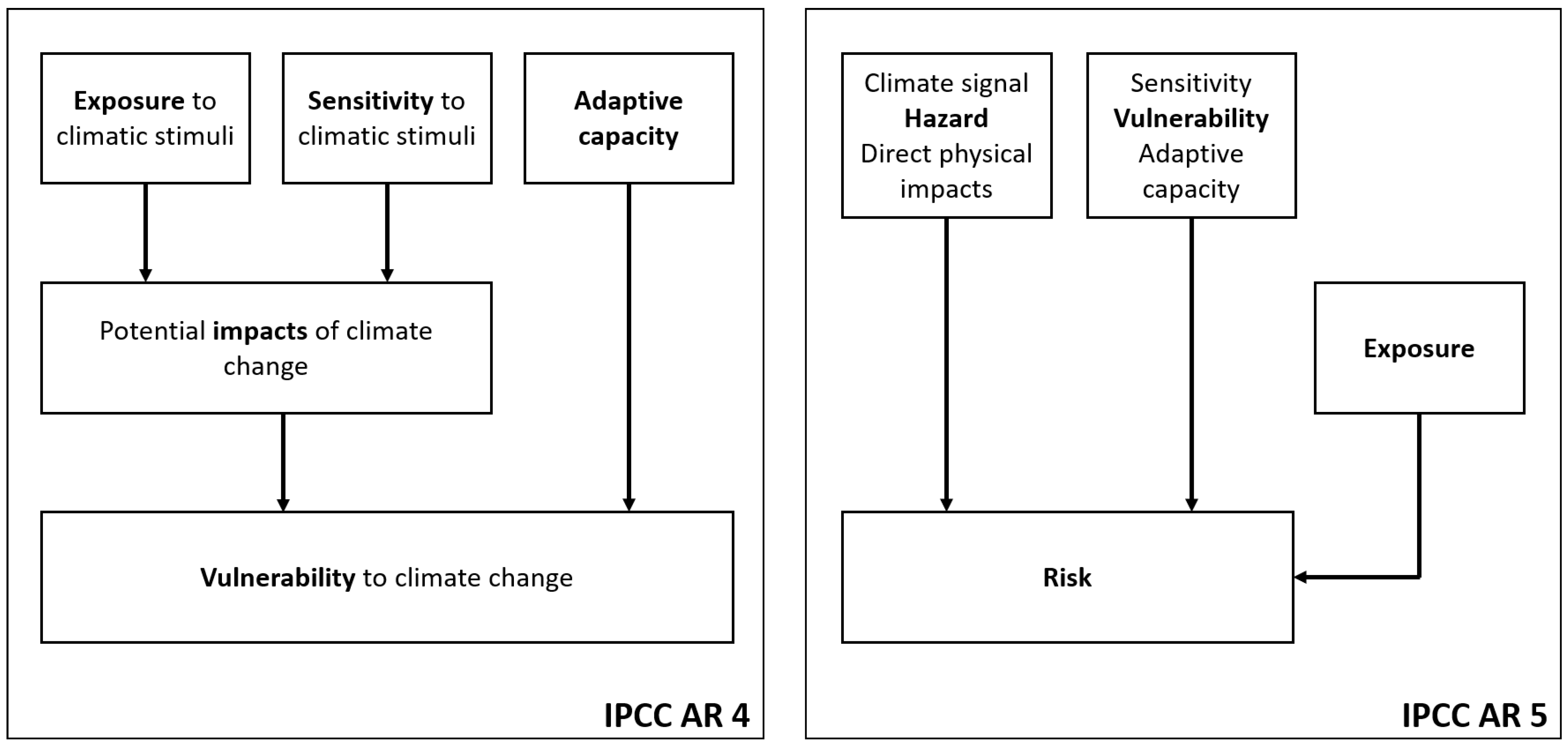
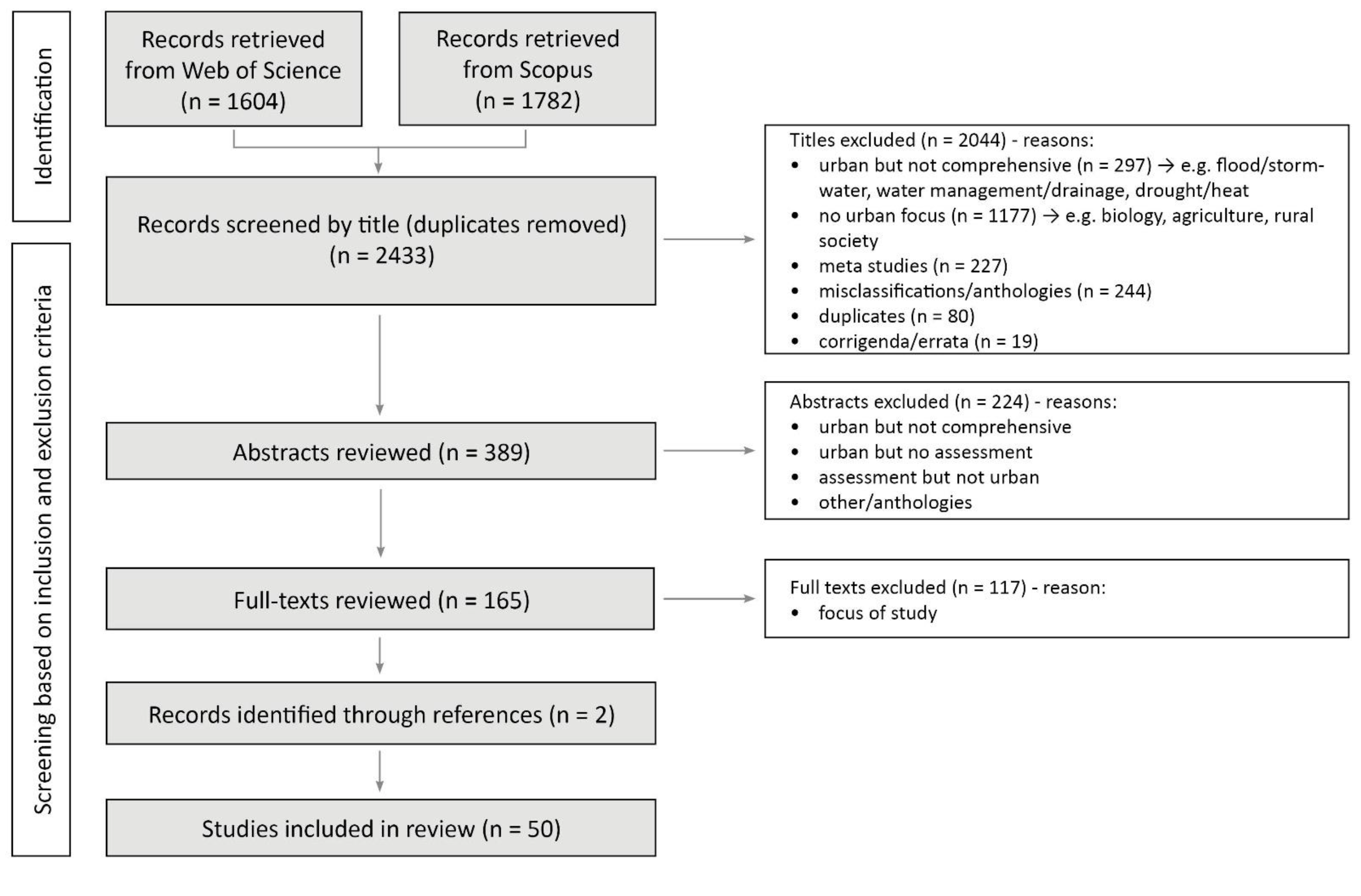
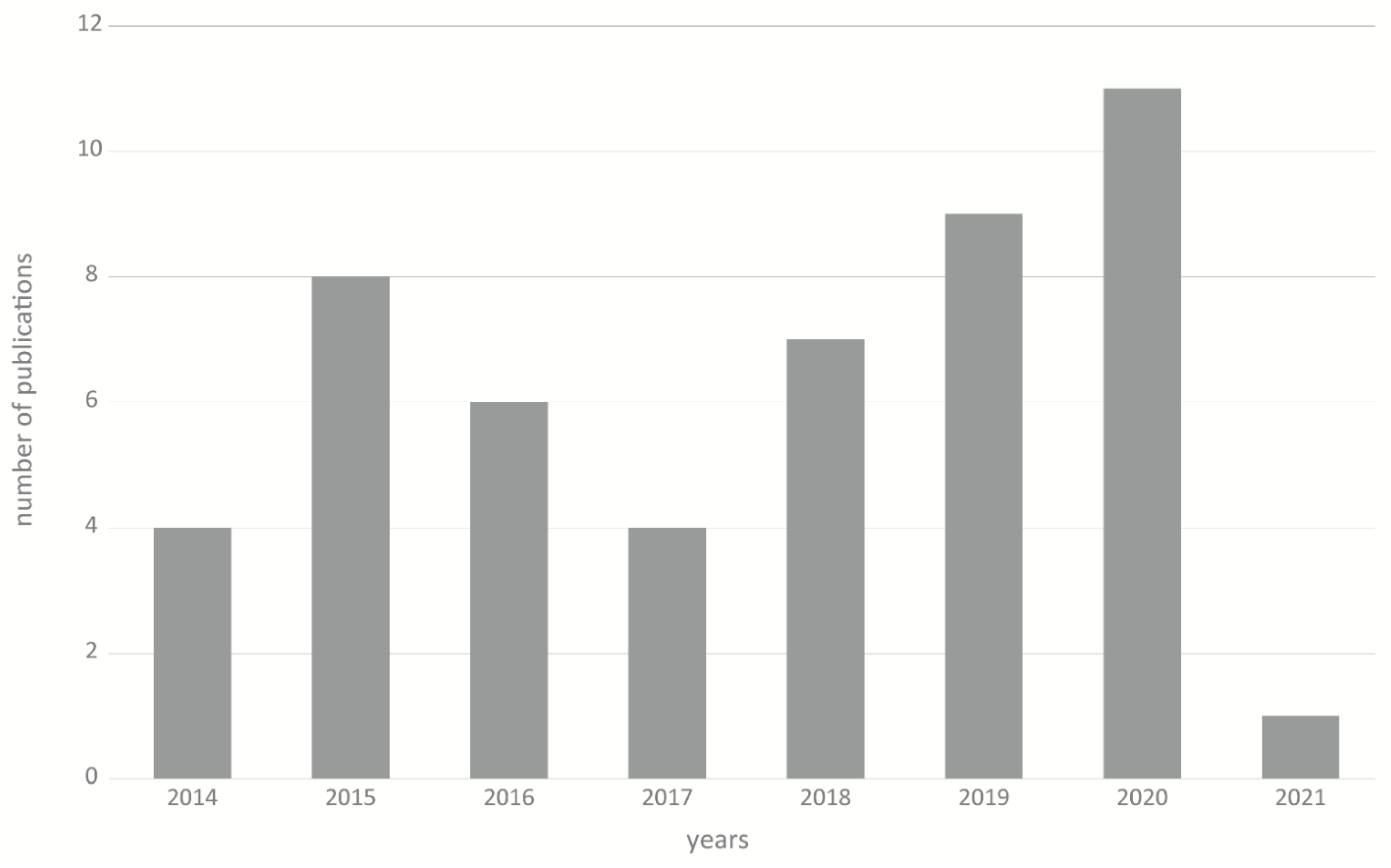
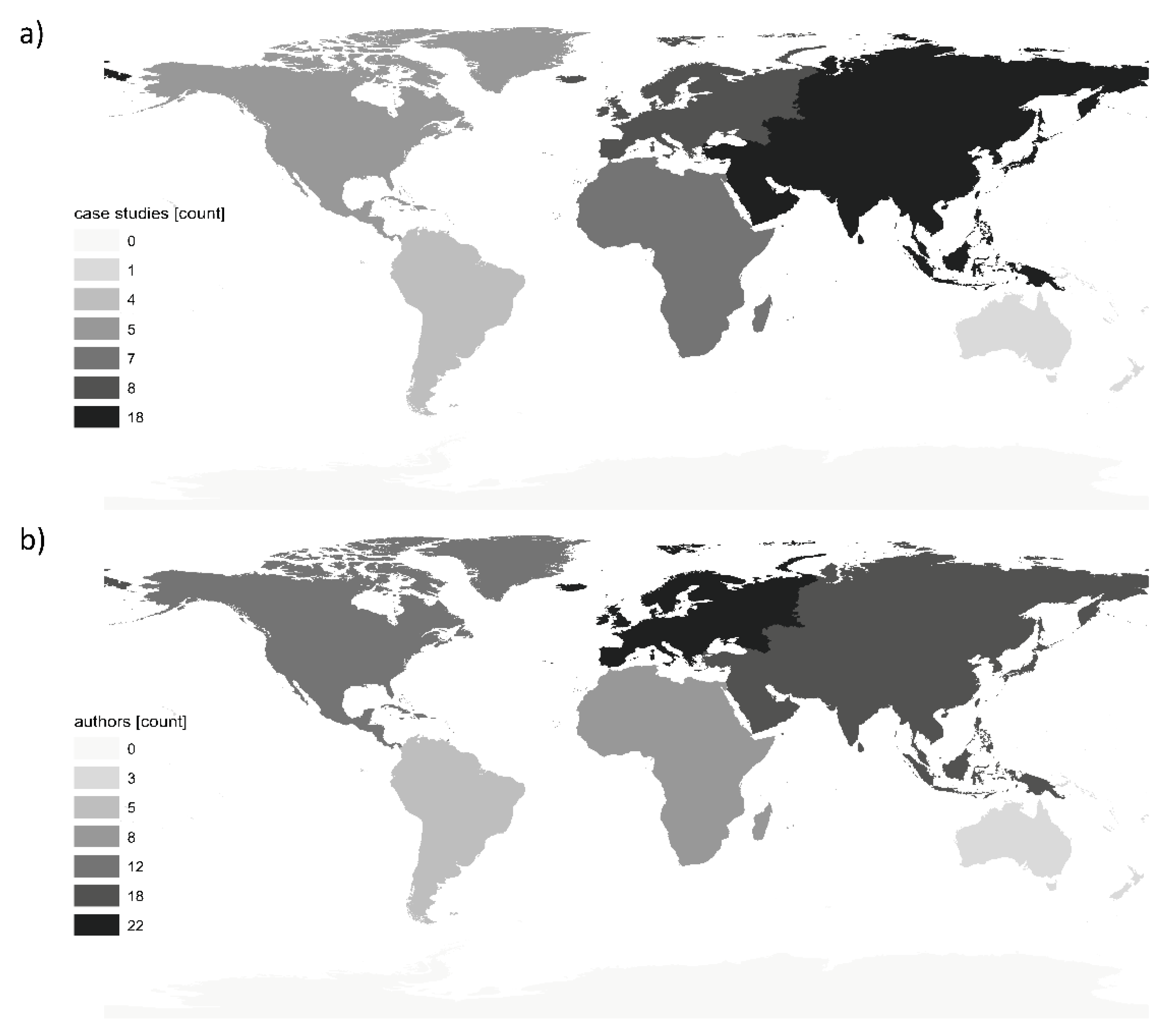
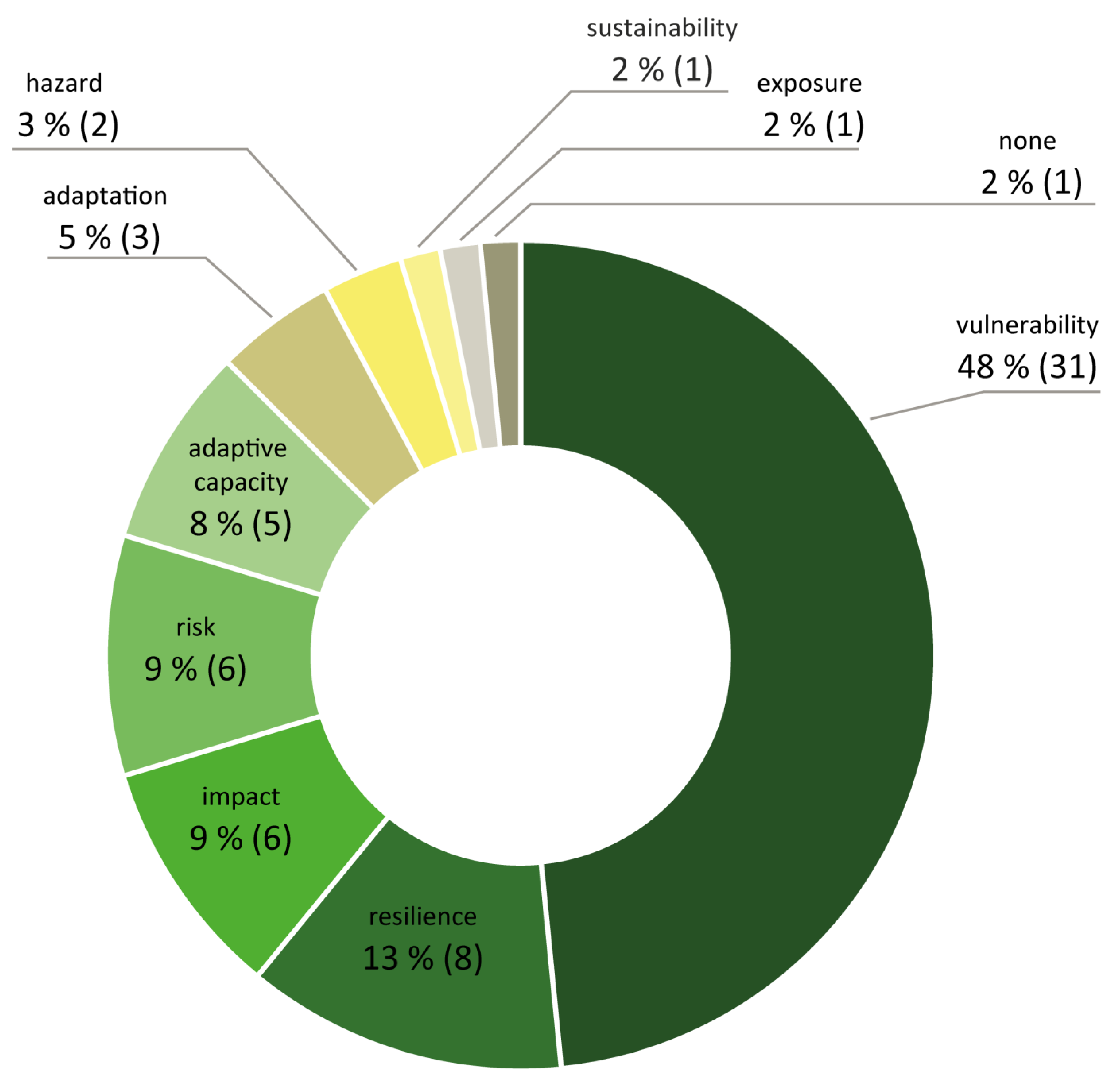
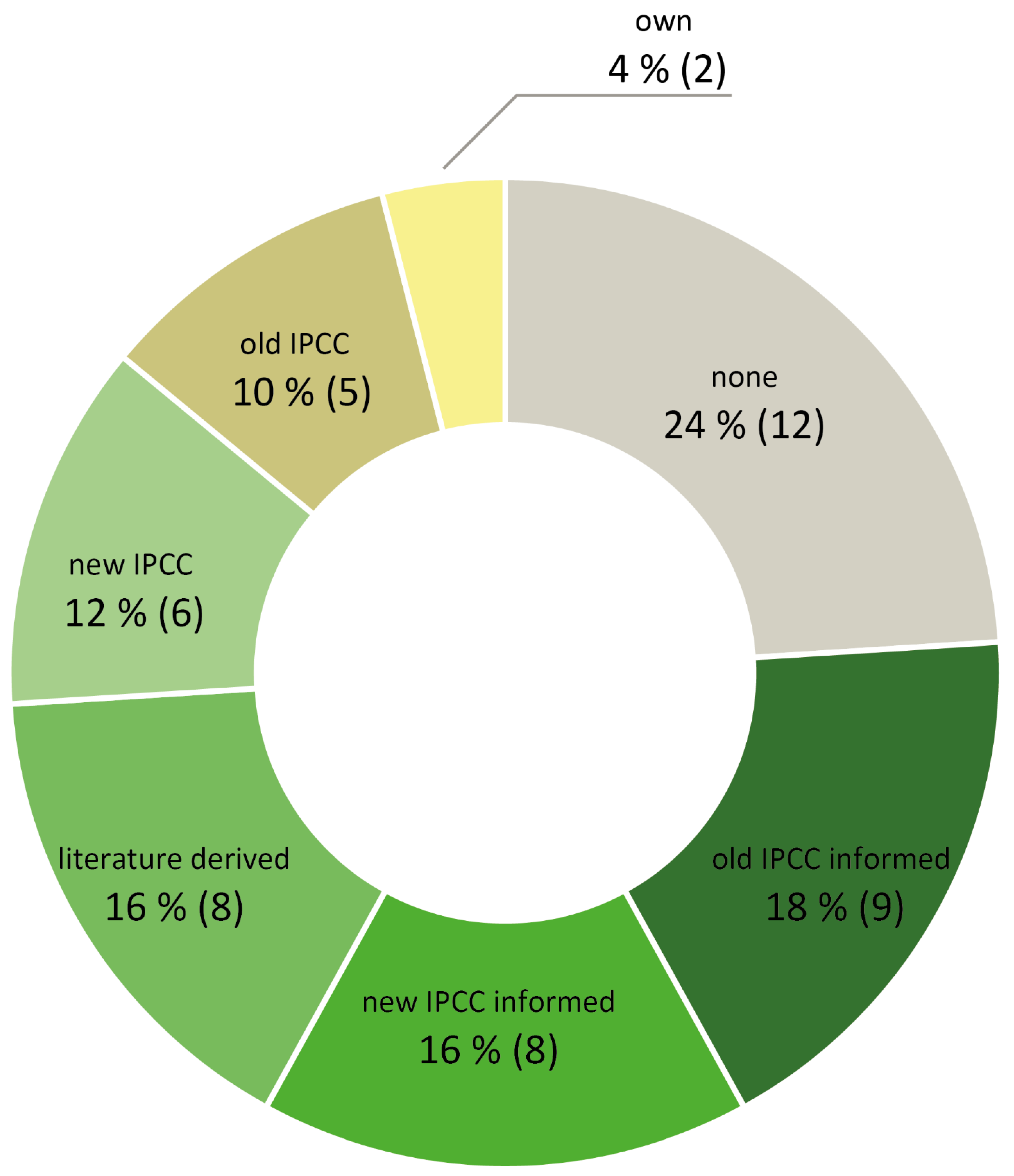
| Sub- Topics | Climate AND | Change AND | Climate Change Effect Related Component AND | Assessment Component AND | Urban Component |
|---|---|---|---|---|---|
| keywords | climat * | chang * | vulnerab * OR risk * OR hazard * OR disaster * OR resilien * OR adapt * OR mitigate * OR expos * OR sensitive * OR impact * OR suscept * OR influenc * OR evidenc * OR effect * OR indicator * OR conceptual framework * | assess * OR evaluat * OR rat * OR estimate * OR measure * OR indicat * OR descry * OR identif * OR analy * OR scan * OR quantif * OR scenario * OR map * OR method * OR approach * OR plan * OR manag * OR index OR indices OR concept * OR strateg * | cit * OR urban * OR settlement * OR communit * |
Publisher’s Note: MDPI stays neutral with regard to jurisdictional claims in published maps and institutional affiliations. |
© 2021 by the authors. Licensee MDPI, Basel, Switzerland. This article is an open access article distributed under the terms and conditions of the Creative Commons Attribution (CC BY) license (https://creativecommons.org/licenses/by/4.0/).
Share and Cite
Klopfer, F.; Westerholt, R.; Gruehn, D. Conceptual Frameworks for Assessing Climate Change Effects on Urban Areas: A Scoping Review. Sustainability 2021, 13, 10794. https://doi.org/10.3390/su131910794
Klopfer F, Westerholt R, Gruehn D. Conceptual Frameworks for Assessing Climate Change Effects on Urban Areas: A Scoping Review. Sustainability. 2021; 13(19):10794. https://doi.org/10.3390/su131910794
Chicago/Turabian StyleKlopfer, Florian, René Westerholt, and Dietwald Gruehn. 2021. "Conceptual Frameworks for Assessing Climate Change Effects on Urban Areas: A Scoping Review" Sustainability 13, no. 19: 10794. https://doi.org/10.3390/su131910794
APA StyleKlopfer, F., Westerholt, R., & Gruehn, D. (2021). Conceptual Frameworks for Assessing Climate Change Effects on Urban Areas: A Scoping Review. Sustainability, 13(19), 10794. https://doi.org/10.3390/su131910794






